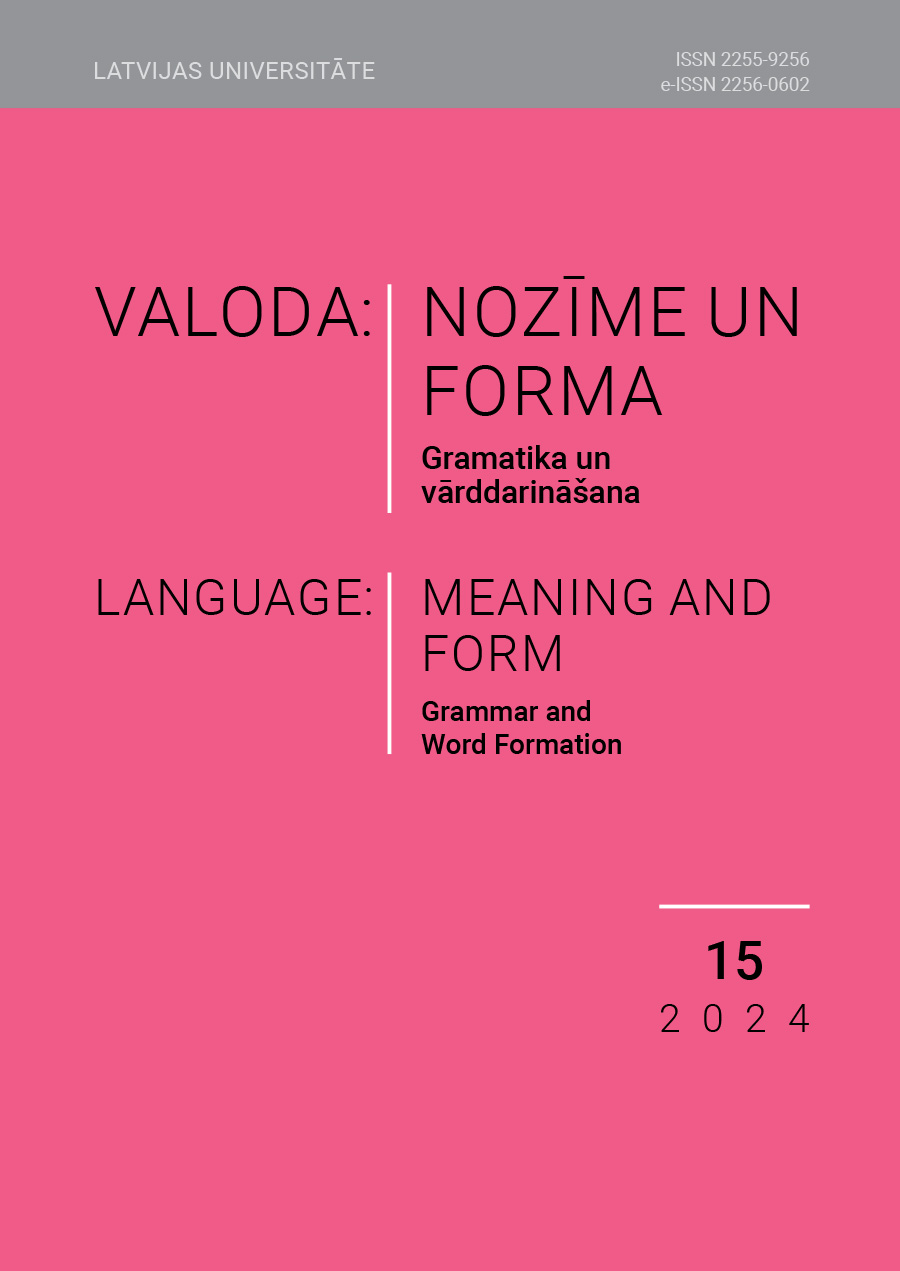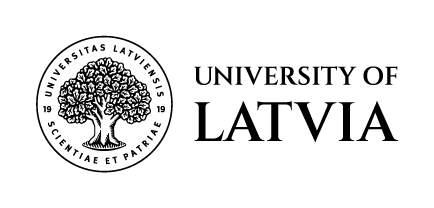A generative syntactic analysis of Latvian grammatical prefixes jā-, ne-
DOI:
https://doi.org/10.22364/vnf.15.08Keywords:
modality, debitive, negative, prefixes, Latvian, split-CP, case assignment, generative frameworkAbstract
The present study explores Latvian grammatical prefixes jā-, ne-, from the generative syntactic perspective. To date, in contrast to significant research within the traditional syntactic dimension, generative syntactic studies of Latvian in general have been very limited (e.g., Apse 2007; Fábregas et al. 2018; Kushnir 2019; Biks 2020), and verbal morphosyntax is yet to become a topic of discussion. Meanwhile, the two grammatical verbal prefixes under analysis raise a number of questions, such as their incompatibility with respect to one another in Standard Latvian, their placement on the generative syntactic tree, and the non-canonical case marking in the debitive construction. To answer these questions, the present study builds on the generative theory of X-bar syntax (Chomsky 1993; 1995), Rizzi’s (1997) Split-CP hypothesis, Case Theory (Chomsky 2001), and previous findings on the Baltic verb (Korostenskiene 2017; 2022). The proposed approach to the debitive construction and accompanying non-canonical case-marking in Latvian is hoped to contribute to the existing field of research as well as to have implications for the study of clausal phenomena in Baltic languages from the generative syntactic perspective.
References
Ambrazas, Vytautas (ed.). 2006. Dabartinės lietuvių kalbos gramatika. Vilnius: Mokslo ir enciklopedijų leidybos institutas.
Apse, Linda. 2007. Who is afraid of generative syntax? Humanities and Social Sciences. Latvia. 4(53), 77–89.
Arkadiev, Peter, Pakerys, Jurgis. 2015. Lithuanian morphological causatives: a corpus-based study. Voice and Argument Structure in Baltic. Holvoet, Axel, Nau, Nicole (eds.). Amsterdam: John Benjamins Publishing Company, 39–97.
Baker, Mark. 1985. The mirror principle and morphosyntactic explanation. Linguistic Inquiry. 16, 373–415.
Biks, Ryan. Dec 2020. A Novel Nanosyntactic Approach to Case in Latvian. Senior Honors Thesis. New York: New York University. Available at: https://as.nyu.edu/content/dam/nyu-as/linguistics/documents/Ryan%20Biks%20Honors%20Thesis%202021.pdf
Brinton, Laurel J. 2010. The development of I mean: implications for the study of historical pragmatics. Methods in Historical Pragmatics. Fitzmaurice, Susan, Taavitsainen, Irma (eds.). Berlin/New York: Mouton de Gruyter, 37–80. https://doi.org/10.1111/j.1749-818X.2008.00087.x
Carnie, Andrew. 2013. Syntax: A Generative Introduction. 3rd ed. Malden, MA: Wiley-Blackwell.
Chomsky, Noam 1993. A minimalist program for linguistic theory. The View from Building 20: Essays in Linguistics in Honor of Sylvain Bromberger. Hale, Kenneth, Keyser, Samuel Jay (eds.). Cambridge, MA: MIT Press, 1–52.
Chomsky, Noam. 1995. The Minimalist Program. Cambridge, MA: MIT Press.
Chomsky, Noam. 2000. Minimalist inquiries: The framework. Step by Step: Essays on Minimalist Syntax in Honor of Howard Lasnik. Martin, Roger, Michaels, David, Uriagereka, Juan (eds.). Cambridge, MA: MIT Press. 89–155.
Chomsky, Noam. 2001. Derivation by phase. Ken Hale: A Life in Language. Kenstowicz, Michael (ed.). Cambridge, MA: MIT Press, 1–52. https://doi.org/10.7551/mitpress/4056.003.0004
Daugavet, Anna. 2017. A corpus-based study of the Latvian debitive vs vajadzēt. Baltic Linguistics. 8, 9–56. https://doi.org/10.32798/bl.376
Dini, Pietro U. 2014. Foundations of Baltic Languages. Vilnius: Eugrimas.
Endzelīns, Jānis. 1971. Comparative Phonology and Morphology of the Baltic Languages. Schmalstieg, William R., Jegers, Benjamins (transl., eds). The Hague/Paris: Mouton.
Fábregas, Antonio, Krämer, Martin, Vulāne, Anna. 2018. On exceptional stress assignment in Latvian: the case of prefixes. Journal of Baltic Studies. 49(4), 529–552. https://doi.org/
1080/01629778.2018.1466817
Fábregas, Antonio, Urek, Olga, Auzina, Ilze. 2016. What Latvian tells us about PCC effects. Iberia: An International Journal of Theoretical Linguistics. 8, 1–30. Available at: https://revistascientificas.us.es/index.php/iberia/article/view/2566
Fennel, Trevor G. 1981. The first description of the Latvian debitive mood. Lituanus. 27(4). Available at: http://www.old.lituanus.org/1981_4/81_4_04.htm
Fernández-Salgueiro, Gerardo. 2020. On EPP effects and the properties of Core Functional Categories. Glossa: A Journal of General Linguistics. 5(1): 36, 1–34. https://doi.org/10.5334/gjgl.842
Fries, Simon, Hill, Eugen. 2023. Establishing the age of the Latvian debitive mood: the evidence of Latgalian. Baltu Filoloģija. 32(1/2), 31–60. https://doi.org/10.22364/bf.32.03
Haegeman, Lilian, Zanuttini, Raffaella. 1991. Negative heads and the neg criterion. The Linguistic Review. 8, 233–251. https://doi.org/10.1515/tlir.1991.8.2-4.233
Holvoet, Axel. 1997. Notes on the Latvian debitive. Res Balticae. 3, 141–152.
Holvoet, Axel. 2001. Mood and modality in Latvian. Sprachtypologie und Universalienforschung/ Language Typology and Universals. 54(3), 226–252. https://doi.org/10.1524/stuf.2001.54.3.226
Holvoet, Axel, Konickaja, Jelena. 2011. Interpretive deontics: A definition and a semantic map based mainly on Slavonic and Baltic data. Acta Linguistica Hafniensia. 43(1), 1–20.
http://dx.doi.org/10.1080/03740463.2011.582765
Ivulāne, Baiba. 2015. Palīgnozīmē lietotu darbības vārdu sistēma latviešu valodā. PhD dissertation. Rīga: University of Latvia. Available at: https://dspace.lu.lv/dspace/bitstream/handle/7/28210/298-46162-Baiba_Ivulane_2015.pdf?sequence=1 [13.04.2020].
Kalnača, Andra. 2014. A Typological Perspective on Latvian Grammar. Warsaw/Berlin: Walter de Gruyter. https://doi.org/10.2478/9783110411317
Kalnača, Andra, Lokmane, Ilze. 2021. Latvian Grammar. Rīga: University of Latvia Press. https://doi.org/10.22364/latgram.2021
Kayne, Richard S. 1994. The Antisymmetry of Syntax. Cambridge, MA: MIT Press.
Kiss, Katalin É. 2020. What determines the varying relation of case and agreement? Evidence from the Ugric languages. Acta Linguistica Hungarica / Acta Linguistica Academica. 67(4), 397–429. https://doi.org/10.1556/2062.2020.00024
Korostenskiene, Julija. 2017. On binding, lexical and superlexical prefixes, and SI in the Baltic verb. Canadian Journal of Linguistics/Revue canadienne de linguistique. 62(3), 449–501. https://doi.org/10.1017/cnj.2016.38
Korostenskiene, Julija. 2022. Baltic topmost superlexical prefixes as the left periphery of the verb: the permissive, the restrictive, the negative, and the debitive. Journal of Baltic Studies. 53(3), 325–351. https://doi.org/10.1080/01629778.2022.2040554
Kratzer, Angelika. 1996. Severing the external argument from its verb. Phrase Structure and the Lexicon. Rooryck, John, Zaring, Laurie (eds.). Dordrecht: Kluwer, 109–137.
Kushnir, Yuriy. 2019. Deceptive datives: Prepositional case in Latvian. Glossa: A Journal of General Linguistics. 4(1): 71, 1–32. https://doi.org/10.5334/gjgl.518
Lokmane, Ilze, Kalnača, Andra. 2014. Modal semantics and morphosyntax of the Latvian DEBITIVE. Modes of Modality. Modality, Typology, and Universal Grammar. Studies in Language Companion Series (SLCS). 149. Leiss, Elisabeth, Abraham, Werner (eds.). Amsterdam/Philadelphia: John Benjamins Publishing Company, 167–192. https://doi.org/10.1075/slcs.149.06lok
Mathieu, Eric André Jean. 2002. The Syntax of Non-Canonical Quantification: A Comparative
Study. PhD Dissertation. University College London. Available at: https://citeseerx.ist.psu.edu/document?repid=rep1&type=pdf&doi=6caba81866b69ac7a37824af61a765 7bb8a266a1
Metuzāle-Kangere, Baiba, Boiko, Kersti. 2001. Case systems and syntax in Latvian and Estonian. Circum-Baltic Languages. Vol. 2. Grammar and Typology. Dahl, Östen, Koptjevskaja-Tamm, Maria (eds.). Amsterdam/Philadelphia: John Benjamins Publishing Company, 481–498. https://doi.org/10.1075/slcs.55.08met
Nau, Nicole. 2011. A Short Grammar of Latgalian. München: LINCOM Europa.
Newmeyer, Frederick J. 2004. On split-CPs, uninterpretable features, and the ‘perfectness’ of language. ZAS Papers in Linguistics. 35(2), 399–421. https://doi.org/10.21248/zaspil.35.2004.235
Quirk, Rodney, Greenbaum, Sidney, Leech, Geoffrey, Svartvik, Jan. 1985. A Comprehensive Grammar of the English Language. London: Longman.
Radford, Andrew. 2009. Analysing English Sentences: A Minimalist Approach. Cambridge: Cambridge University Press. https://doi.org/10.1017/CBO9780511801617
Rizzi, Luigi. 1997. The fine structure of the left periphery. Elements of Grammar. Haegeman, Lilian (ed.). Dordrecht: Kluwer. 281–337. https://doi.org/10.1007/978-94-011-5420-8_7
Rizzi, Luigi. 2005. On the grammatical basis of language development: A case study. The Oxford Handbook of Comparative Syntax. Cinque, Guglielmo, Kayne, Richard S. (eds.). New York: Oxford University Press. 70–109.
Roberts, Ian, Roussou, Anna. 1999. A formal approach to grammaticalization. Linguistics. 11(1), 1011–1041.
Roberts, Ian, Roussou, Anna. 2003. Syntactic Change: A Minimalist Approach to Grammaticalization. Cambridge: Cambridge University Press. https://doi.org/10.1515/BGSL.2007.469
Searle, John R., Vanderveken, Daniel. 1985. Foundations of Illocutionary Logic. Cambridge: Cambridge University Press.
Seržant, Ilja, Taperte, Jana. 2016. Differential argument marking with the Latvian debitive: a multifactorial analysis. Argument Realization in Baltic. Vol. 3. Valency, Argument Realization and Grammatical Relations in Baltic. Holvoet, Axel, Nau, Nicole (eds.). Amsterdam/Philadelphia: John Benjamins Publishing Company, 199–258. https://doi.org/10.1075/vargreb.3.05ser
Solà, Jaume. 2002. Clitic climbing and null subject languages. Catalan Journal of Linguistics. 1, 225–255. https://doi.org/10.5565/rev/catjl.60
Svenonius, Peter. 2004. Slavic prefixes inside and outside VP. Nordlyd. 32(2), 205–253. https://doi.org/10.7557/12.68
Traugott, Elizabeth C. 1989. On the rise of epistemic meaning in English: an example of subjectification in semantic change. Language. 65, 31–55. https://doi.org/10.2307/414841
Wischer, Ilse. 2000. Grammaticalization versus lexicalization: “Methinks” there is some confusion. Pathways of Change: Grammaticalization in English. Fischer, Olga, Rosenbach, Anette, Stein, Dieter (eds.). Amsterdam/Philadelphia: John Benjamins Publishing Company, 355–70. https://doi.org/10.1075/slcs.53.17wis
Zanuttini, Raffaella, Pak, Miok, Portner, Paul. 2012. A syntactic analysis of interpretive restrictions on imperative, promissive, and exhortative subjects. Natural Language and Linguistic Theory. 30, 1231–1274. https://doi.org/10.1007/s11049-012-9176-2
Downloads
Published
Issue
Section
License

This work is licensed under a Creative Commons Attribution-NoDerivatives 4.0 International License.


